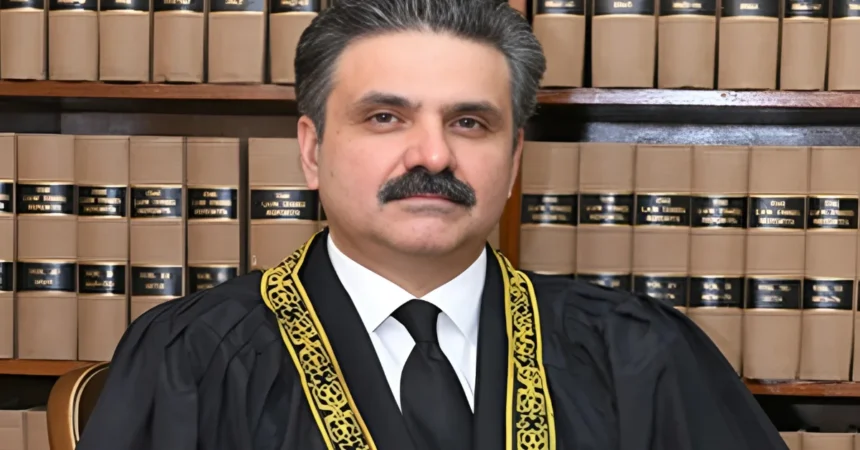Justice Yahya Afridi has officially been appointed as the Chief Justice of Pakistan, a decision that marks a pivotal moment for the nation’s judiciary. Following President Asif Ali Zardari’s approval, the Ministry of Law and Justice issued a formal notification confirming his appointment. Justice Afridi is set to take the oath of office on October 26, succeeding the outgoing Chief Justice, Qazi Faez Isa.
Background of Justice Yahya Afridi
Justice Afridi brings a wealth of judicial experience to his new role. He has served as a judge on the Supreme Court of Pakistan, where he has been involved in numerous landmark cases that have shaped the legal landscape of the country. Known for his integrity, fairness, and commitment to justice, Afridi has earned respect from both his peers and the public.
Born into a family with a legal background, Afridi pursued law at a young age. He graduated from the University of Peshawar and furthered his education in the United States, where he received advanced legal training. His extensive background in law includes various roles in the judicial system, ranging from a district judge to a Supreme Court judge. His career has been marked by a steadfast dedication to upholding the rule of law and ensuring justice for all.
The Appointment Process
The appointment of Justice Afridi followed a rigorous selection process. A parliamentary committee composed of 12 members nominated him with a two-thirds majority. The committee’s decision was finalized with a vote of 8-1, which showcased significant support across political lines, although it also highlighted some dissenting opinions.
Senator Kamran Murtaza of the Jamiat Ulema-e-Islam (JUI) voted in favor of Justice Mansoor Ali Shah, indicating some divisions within the committee. Notably, members of the Pakistan Tehreek-e-Insaf (PTI) were absent from the meeting, suggesting that internal party dynamics may have influenced their participation.
Following the committee’s recommendation, the Prime Minister forwarded the nomination to President Zardari, who officially appointed Justice Afridi under the constitutional provisions outlined in Articles 175A (3), 177, and 179. These articles provide a framework for judicial appointments, emphasizing the importance of transparency and democratic principles in the selection process.
Judicial Philosophy and Priorities
As Justice Afridi prepares to assume the role of Chief Justice, observers are keenly interested in his judicial philosophy and priorities. His previous rulings and opinions indicate a commitment to an independent judiciary that upholds constitutional values. Many expect him to prioritize access to justice and address the longstanding backlog of cases within the system.
One of the significant challenges facing the judiciary is the perception of inefficiency and delays in case resolutions. Under his leadership, there is hope for initiatives aimed at expediting the legal process and making the judiciary more accessible to ordinary citizens. Justice Afridi’s approach to these issues will be closely monitored by both legal experts and the public.
Moreover, Afridi is expected to tackle pressing societal issues, including human rights violations, corruption, and political interference in judicial matters. His tenure comes at a time when the judiciary is under scrutiny for its role in high-profile cases, and his ability to navigate these challenges will be critical for maintaining public trust.
Expectations from Legal Community
The legal community has expressed optimism regarding Justice Afridi’s appointment. Many legal experts believe that his extensive experience and principled approach to justice will foster a more robust judicial system. Lawyers and advocates have lauded his track record of fair judgments and his commitment to upholding the law.
Afridi’s previous rulings have often demonstrated a deep understanding of the complexities of legal issues, which is essential for a Chief Justice. His ability to engage with both constitutional and administrative matters will be crucial as he leads the Supreme Court through a potentially tumultuous political landscape.
Furthermore, the Chief Justice’s relationship with the bar associations and legal practitioners will play a vital role in shaping the judiciary’s future. Many in the legal community hope that Afridi will prioritize dialogue and collaboration with legal professionals to address common concerns and improve the judicial process.
The Role of the Chief Justice
The Chief Justice of Pakistan holds a pivotal position within the judicial system. This role entails not only presiding over court proceedings but also guiding the administrative functions of the Supreme Court. The Chief Justice plays a crucial role in determining the composition of benches, managing case schedules, and ensuring that the judiciary operates efficiently.
Additionally, the Chief Justice often represents the judiciary in discussions with the executive and legislative branches of government. This position requires balancing the independence of the judiciary with the need for cooperation among the different branches of government. Afridi’s ability to navigate these relationships will be essential for maintaining the judiciary’s integrity.
Potential Challenges Ahead
Justice Afridi’s tenure will not be without challenges. The political landscape in Pakistan is often contentious, and the judiciary has been at the center of various political crises. Navigating these challenges while maintaining judicial independence will be crucial for Afridi’s success.
One significant issue is the ongoing scrutiny of judicial decisions in high-profile political cases. The judiciary’s role in these matters has led to accusations of political bias, which can undermine public confidence in the legal system. Afridi will need to demonstrate impartiality and fairness to counteract these perceptions.
Moreover, the increasing prevalence of social media and public opinion can complicate judicial processes. As public scrutiny intensifies, the Chief Justice may face pressure to align judicial decisions with popular sentiment, which could conflict with legal principles. Balancing public expectations with the need for legal integrity will be a crucial task for Afridi.
Historical Context of the Judiciary
To understand the significance of Afridi’s appointment, it is essential to consider the historical context of the judiciary in Pakistan. The judicial system has experienced periods of both strength and turmoil, often reflecting the broader political landscape. The judiciary has sometimes been criticized for being influenced by political powers, leading to concerns about its independence.
In recent years, various Chief Justices have attempted to assert the judiciary’s role as a check on executive power, often leading to clashes between the branches of government. Afridi’s appointment signals a potential continuation of this trend, as he is expected to advocate for judicial independence and accountability.
Expectations from the Government
The government’s role in supporting an independent judiciary is paramount. For Afridi to effectively carry out his duties, there must be a commitment from the executive branch to respect the judiciary’s autonomy. This includes refraining from political interference in judicial matters and allowing the courts to function without undue pressure.
Additionally, adequate resources and support for the judiciary are essential to address systemic issues such as case backlogs and delays. Ensuring that the judiciary has the necessary infrastructure and staffing to operate efficiently will be critical for Afridi’s efforts to enhance the judicial process.
Public Perception and Trust
The public’s perception of the judiciary is another crucial factor that will impact Afridi’s tenure. Building public trust in the legal system requires transparency and accountability. The Chief Justice will need to communicate effectively with the public, demonstrating that the judiciary is committed to justice and fairness.
Engaging with civil society organizations and legal advocacy groups can help bridge the gap between the judiciary and the public. By fostering dialogue and addressing community concerns, Afridi can work towards restoring faith in the legal system.
Looking Ahead
As Justice Yahya Afridi prepares to take on the responsibilities of Chief Justice, there is a sense of anticipation regarding the changes he may implement. His leadership will undoubtedly shape the future of Pakistan’s judiciary and its role in society.
The coming years will be critical for the judicial system as it faces both internal and external challenges. Afridi’s ability to address these issues while maintaining the integrity of the judiciary will be essential for ensuring that justice prevails in Pakistan.
With a focus on transparency, efficiency, and public engagement, Justice Afridi has the potential to make a lasting impact on the legal landscape of the country. As he embarks on this new chapter in his career, the eyes of the nation will be upon him, watching closely as he navigates the complexities of the role.
#ChiefJustice #YahyaAfridi #PakistanJudiciary







